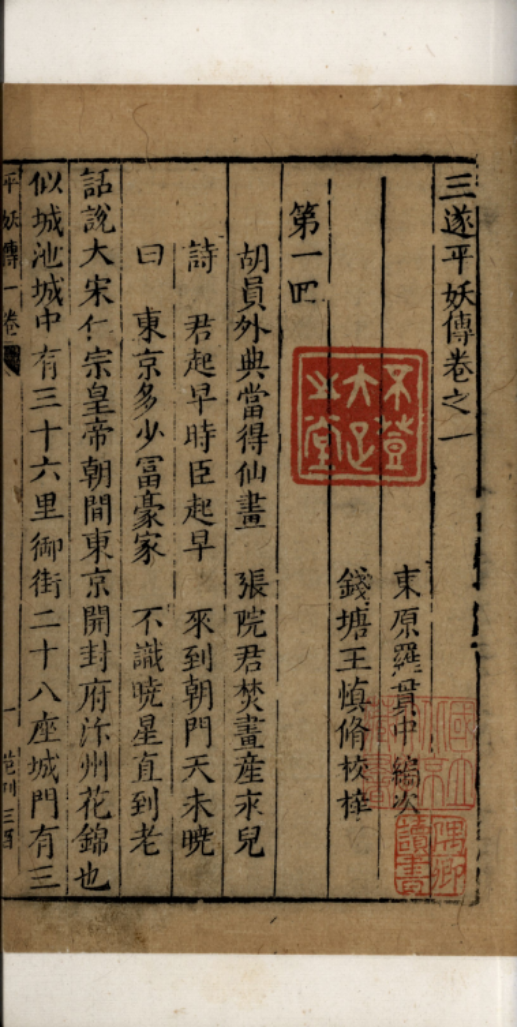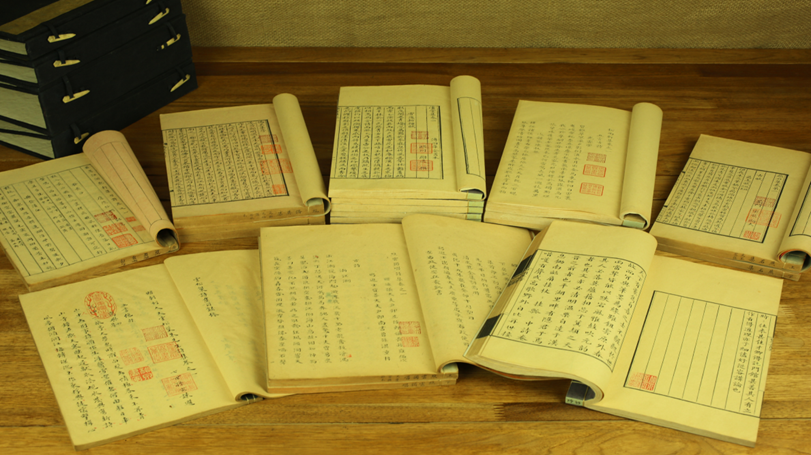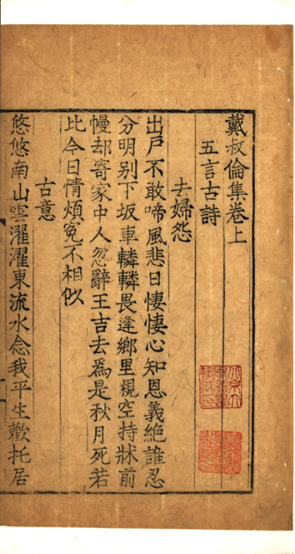Since Peking University is one of the earliest comprehensive universities in modern China, the ancient literature collected by the Peking University Library keeps growing with the development of the university. By far, the total collection of ancient books has reached 1.6 million volumes. More than 20,000 titles of them are rare books (totaling over 200,000 volumes), and 427 of them have been selected into National Catalogue of Precious Ancient Books while 88 of them have been selected into the list of Facsimile Reprint Project of Chinese Rare Books . In terms of both the total quantity and the number of rare books, Peking University Library ranks first among the university libraries in China, and third among all libraries in the country just after the National Library of China and the Shanghai Library. In 2008, Peking University Library was chosen as one of the first batch of major institutions for ancient books protection at the national level.
Important large collections from different periods are as follow:
1.Fang Gonghui's Bilinlang Book Vault Collection
In the 24th year of the Guangxu reign of the Qing Dynasty (1898), the Imperial University of Peking was established along with its library. The first batch of rare books in the library came from donations of the Baling Fang family’s Bilinlang Book Vault. The owner of the Bilinlang Book Vault, Fang Gonghui, whose birth year is unknown, passed away in the 25th year of the Guangxu reign (1899), with the name Qingling and the name Liuqiao. He was born in Baling, Hunan Province. Before Fang Gonghui's death, he had a collection of over 100,000 volumes books. Later, most of the Fang family's collection was sold to the Liulichang Bookstore, and the remaining portion was donated to the Imperial University of Peking. This batch of books became the foundational collection of rare books in the library of the university.

Figure 1: Fang Gonghui's Rare Collection of Bilinlang Book Vault- Ming Dynasty Edition of "Du Lv Yi Jian"
2. Ma Lian's “Budeng Dayazhitang” Book Vault Collection
In 1937, Peking University Library purchased 928 titles and 5368 volumes of Ma Lian's collection. Ma Lian was born in the 19th year of the Guangxu reign (1893) and passed away in the 24th year of the Republic of China (1935). He was a professor of Peking University, a book collector, and a writer of modern novels and traditional Chinese operas. Ma's collection mainly consists of engraved and copied versions of novels and traditional Chinese operas from the Ming and Qing dynasties.

One of the rare and precious collections in the Book Vault of Ma Lian “Budeng Dayazhitang ”: the Ming Dynasty version of "Sansui Ping Yao Zhuan (Quelling the Demons’ Revolt)"
3. Li Shengduo's Collection of Books in the Muxi Book Vault
Li Shengduo has a large collection of books with selected versions and extensive content that surpassed many collectors. In the 28th year of the Republic of China (1939), the majority of Li's collection was sold to the puppet government of Beiping for 400,000 yuan, and later handed over to Peking University Library for preservation. It contained 9,087 titles and 58,385 volumes of books, which are the essential collection of the rare books collected by Peking University. Among them, there are nearly 300 titles of Song and Yuan Dynasty version books, over 1,400 Ming Dynasty version books (including engraved, copper and wood movable type editions), over 1,000 transcripts, over 150 manuscripts, and some celebrity manuscripts and postscripts. There are also a large number of Japanese block-printed editions, transcripts, and some Korean publications.

Figure 3: One of the rare collections of Li Shengduo's Collection: Song engraved version of "Chun Qiu Zhuan (Spring and Autumn Annals)"
4. Miao Quansun's Rubbings of the Yifeng Book Vault
Miao Quansun (1844-1919), also known as Yanzhi and Xiaoshan, was a famous philologist in modern Chinese history, and was born in Jiangyin, Jiangsu Province. Miao Quansun was fond of collecting books and named his book vault Yifeng Tang(Yifeng Book Vault). During his official travels, he continuously purchased over 100,000 volumes of books. In 1925, the School of Chinese Studies at Peking University purchased the rubbings of Miao Quansun's Yifeng Book Vault. In 1952, rubbings of Yifeng Book Vault, along with those in Liufeng Book Vault, were transferred to Peking University Library.
5. Zhang Renli's Rubbings of the LiuFeng Book Vault
During the War of Resistance Against Japan, Zhang Renli served as the mayor of Tianjin and a member of the North China Political Affairs Committee under the Wang puppet government. After the victory of the war, in 1946, rubbings of Zhang Renli's Liu Feng Book Vault were taken as illegal property and transferred by the government to the Institute of Liberal Arts at Peking University. In 1952, rubbings of Liu Feng Book Vault, along with rubbings of Yifeng Book Vault, were transferred to Peking University Library.
6. Library Collection of Yenching University
In 1952, the country restructured departments in universities and colleges, and the collection of over 500,000 volumes of books from the Yenching University Library was merged into Peking University Library. Among them, there were 3,897 rare books and nearly a hundred titles of Song and Yuan edition books. There are also a large number of Ming Dynasty engraved copy, early Qing Dynasty engraved copy, Ming and Qing Dynasty transcripts, manuscripts, as well as a certain number of Dunhuang manuscripts, celebrity letters and diaries. These collections are highly valuable for both academic and cultural studies.

Figure 4: One of the Rare Books in the Library of Yenching University: The Qing Dynasty Transcript of " Zhiyan Zhai Chongping Shitou Ji (Zhiyan Zhai's Second Review of the Story of the Stone)"
7. Cheng Yanqiu's Yushuang Yi Collection
On November 4, 2005, Peking University Library purchased the "Yushang Yi Collection" for 5.5 million yuan from the autumn auction of Beijing Jiade International Auction Co., Ltd. "Yushang Yi Collection" originally belonged to the famous Peking Opera master Cheng Yanqiu. This batch of collection contained 1,563 volumes in total, including 1,436 titles of repertoire, most of which are Kunqu scripts, and a few of Peking Opera and Qin Opera scripts. Among them, there were as many as 1,000 titles of traditional opera transcripts written by Chen Jinque, a famous Kunqu actor in Jiaqing and Xianfeng reign in the Qing Dynasty. In 2014, PKU Library compiled a series of 44 volumes of the "Peking University Library Collection of Cheng Yanqiu Yushuang Yi Traditional Opera Rare Edition Series". In this series, some of the Cheng family's collections were photocopied and published for the convenience of readers.

Figure 5: One of the rare collections of Cheng Yanqiu’s Yushuang Yi: Gongchi Score of "Pipa Ji (The Story of the Pipa)"
8. Da Cang Book Vault
On December 12, 2013, with the support of relevant national departments, the collection of "Da Cang Book Vault" purchased by Peking University for 150 million yuan was successfully transported to Peking University Library. The majority of the "Da Cang Book Vault" is the collection of Chinese book collectors Dong Kang's Songfen Book Vault and Tan Xiqing's Zhengwen Book Vault, which were purchased by the Japanese entrepreneur Akira Okakura in 1912. It has been well preserved in the Okakura Jigu Book Vault for over a hundred years, and the repurchase of the "Da Cang Book Vault" is the largest amount of return of Chinese books in a century.

Figure 6 Rare copies of the Da Cang Book Vault

Figure 7: One of the Rare Books in the “Da Cang Book Vault”: The Ming Dynasty copper movable type printed copy of “Dai Shulun Collection”
In various periods, the government and people from all walks of life have donated plenty of ancient literature to the Peking University Library. In the past 10 years, the Peking University Library has received donations from both domestic and international scholars, including Ji Xianlin, Tang Yijie, Fu Jingbo, Chen Qinghua, Yu Dawei, and others. These donations from famous scholars have made significant contributions to the quantity and quality growth of ancient literature in Peking University Library.





